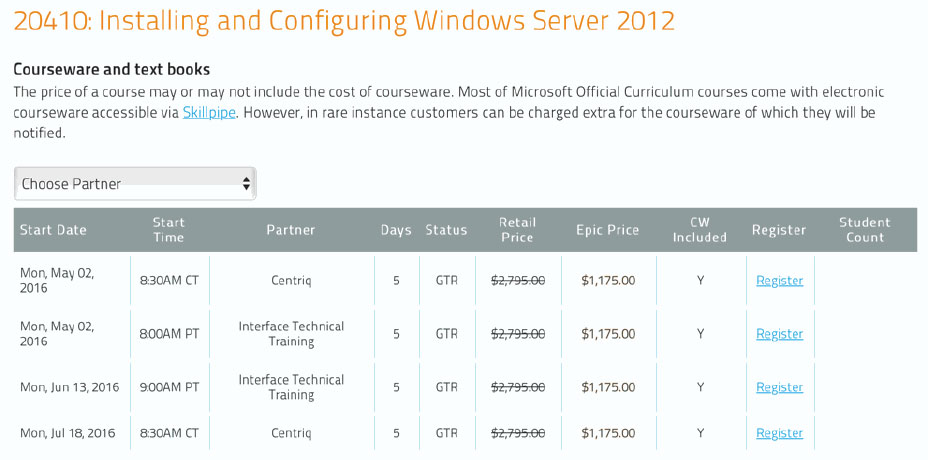ITIL-SO: ITIL SO Intermediate Lifecycle Service Operations with Certification Exam
About this Course
Service Operation Certificate is part of the ITIL® Intermediate Lifecycle stream, and is one of the modules that lead to the ITIL Expert in IT Service Management Certificate. This 3-day course covers the management and control of the activities and techniques within Service Operation, but not the detail of each of the supporting processes. You will gain knowledge to plan, implement and optimize the Service Operation processes and help prepare to take the ITIL Intermediate Qualification: Service Operation Certification Exam.
Audience Profile
Individuals who require a detailed understanding of the ITIL® Service Transition phase of the ITIL core Lifecycle and how it may be implemented to enhance the quality of IT service provision within an organization. CIOs, CTOs, managers, supervisory staff, team leaders, planners, IT audit managers, IT security managers. This course is valuable for those who want to achieve the ITIL® Intermediate Qualification: Service Operation.
At Course Completion
At the end of this 3 day course, the student will gain competencies and prepare to:
- Introduction to Service Operation
- Service Operation Principals
- Service Operations Processes
- Common Service Operations Activities
- Organizing Service Operation: Functions
- Technology Considerations
- Implementation Considerations
- Challenges, Critical Success Factors and Risks
- Maintain stability in Service Operations while allowing for changes in design, scope and service levels
- Support operations through new models and architectures such as shared services
- Prepare for and take ITIL® Intermediate Qualification: Service Operation Certification Examination
Outline
1. Service Operations and the overall ITIL® Lifecycle
- Principles and objectives
- Functions and common activities
- How Service operation creates business value
- Challenges, critical success factors and risks
2. Balancing Conflicting Goals
- Internal IT vs. external business view
- Stability vs. responsiveness
- Quality of Services (QoS) vs. cost of services
- Reactive and proactive activities
3. Core Service Operation Processes
- Primary ITIL® processes within Service Operation
- Event management: Active and Passive Monitoring
- Restoring normal service through Incident Management
- Request fulfillment
- Managing Problems with Root Cause Analysis
- Access Management
4. Operational Activities of other ITIL® Processes
- Change, Configuration and Release Management
- Capacity and Availability Management
5. Common Service Operation Activities
- CMonitoring and Control of IT Operations
- Detecting the status of services and CIs
- Taking appropriate corrective action
- Console management/operations bridge: a central coordination point for monitoring and managing services
6. Management of the Infrastructure
- Mainframe, Server and Network Management
- Storage and database management
- Managing directory services and desktop support
- Facilities and datacenter management
- Managing IT security in service operations
- Improving operational activities
7. Operational aspects of processes from other lifecycle phases
- Change, configuration and release
- Availability
- Capacity
- Service continuity
8. Organizing for Service Operation/Mapping Service Operation functions to activities
- Roles and responsibilities
- Understanding the organizational context
9. Service Operation structure
- Service Desk
- Technical Management
- IT Operations Management
- Application management
10. Key functions of the Service Desk
- Logging incidents and requests
- First-line investigation and diagnosis
- Managing the lifecycle of incidents and requests
- Keeping users informed
11. Structuring the Service Desk
- Local vs. centralized
- The virtual service desk
- Follow-the-sun operation
12. Technology Related Issues
- Technology, tools and expertise requirements
- Defining architecture standards
- Involvement in the design and build of new services and operational practices
- Contributing to Service Design, Service
- Transition and Continual Service Improvement projects
- Evaluating change requests
- Matching technology to the organizational situation
13. Implementation Challenges and Risks
- Managing change in service operations
- Service operation and project management
- Assessing and managing risk
- Operational staff in design and transition
- Planning and implementing service management technologies
Prerequisites
Students should hold an ITIL® 2011 or v3 Foundation Certificate or ITIL® v2 Foundation + v3 Foundation Bridge Certificate. Proof of certification is required to sit the exam.
Before taking the course, it’s recommended (though not required) that candidates have approximately two years exposure to basic concepts in IT and related work experience.

